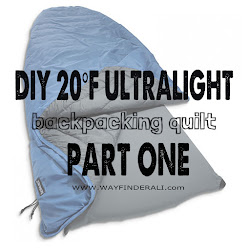 |
This is what I already have-
The fitted sheet and tech blanket by
Thermarest
|
- The insulation underneath you in a sleeping bag gets so compressed that hardly provides any insulation
- Quilts weigh less
- I toss and turn at night and sleep on my stomach, back and side. Mummy bags annoy me.
- I already have the Thermarest sleep system which consists of a fitted sheet for my sleeping pad and a very lightweight tech blanket that snaps to it. I plan to use my fitted sheet with my DIY cold weather quilt.
- I couldn't afford a high quality 20°F mummy bag that weighed a reasonable amount.
Why bother making it myself?
- I have read online that people with no sewing experience have been very successful making these. I have a good amount of sewing experience so I hope it will be easier for me.
- The wait time to get a quilt from a manufacturer is up to 8 weeks and I didn't have that long to wait.
- I saved $80 by making it myself
- I get to make my blanket in the colors I want and with all the details I want
Design and Dimensions
I think the Prodigy is a good product at a reasonable price ($180), but I really needed to save the $80 and make it myself. I also wanted specific colors and a specific kind of liner fabric.
- A casing (sewn channel of fabric) at the shoulders and foot with a bungee cord inside make it easy to create a foot box and cinch the quilt around the shoulders, eliminating heat loss.
- The simplicity of the design lends itself to ease of construction- it is a simple polygon without a hood, pockets or sewn channels
- The Enlightened Equipment website provides the exact dimensions for quilts to fit different sized people which eliminated the guesswork of figuring out how long and wide my quilt needed to be in order to be comfortable for my size. Here is a link to their Quilt Sizing page which has all the details.
I used the specs for the Short length, Narrow Width quilt which is for little people up to 5'6" who sleep on their backs or toss and turn at night. The finished specs for it are as follows:
Basic Specs:
Total length: 72"
Top half width- 50"
Tapers to 38 " at the foot box.
I chose to make my quilt go to 20°F because I tend to be a very cold sleeper. Here is a chart to help you choose which weight Climashield you should use:
2.5 oz - 50°F $7.00/yd
3.6 oz - 40°F $9.00/yd
5.0 oz - 30°F $10.95/yd
7.5 oz - 10°F $16.95/yd
10 oz - 0°F $23.50/yd
Materials List:
- 1.0 oz HyperD calendared Ripstop nylon 3 yards $20.85 (outside of quilt)
- Hexon 1.0 2 yards $13.50 (inside of quilt- because it is very soft and light)
- Climashield 7.5 oz, 2 yards $33.90
- 1 yd 1/2" grosgrain $0.25
- 4 mini cord locks $2.80/dozen
- 1/16" bungee or paracord 3 yards
- 5 yards 1/2" flat elastic for sleeping pad straps
- 10 1/2" center release plastic buckles $8
- Guterman MARA 70 thread (free with fabric purchase from RipstopByTheRoll)
Total Cost: $96 with shipping
Tools and necessities:
- Sewing Machine with walking foot
- Quilting Straight pins at least 1 3/4" long
- Hot knife / Woodburner with blade tip or scissors and lighter for cutting nylon
- Lighter for sealing cut ends of bungee and elastic
- Measuring tape
- Yardstick or long straight edge
- Square
- Tailors chalk
- Dumbell weights to hold materials down
Connection Options
Many quilts including those from Enlightened Equipment and Thermarest have systems to connect the quilt to the sleeping pad. This keeps the quilt from moving around when you toss and turn.
 |
| The Enlightened Equipment quilt strap system |
The Enlightened Equipment system uses small clips along the sides of the quilt that correspond with clips on pieces of elastic that fit around the sleeping pad. This enables the user to snug the quilt up tightly around the body in cold weather. This system would be easy to integrate into a DIY quilt. Here is a link to a detailed description of how that system works.
 |
| Thermarest Loops and Snaps |
Someone on the Hammock Forums mentioned adding 'draft stoppers' to the edges of
 |
| The darker blue fabric on the edges is the draft stopper |
Did you find this post helpful? Do you enjoy reading this blog? Help me keep it going by buying me a 'coffee'

Did you find this post helpful? Do you enjoy reading this blog? Help me keep it going by buying me a 'coffee'






